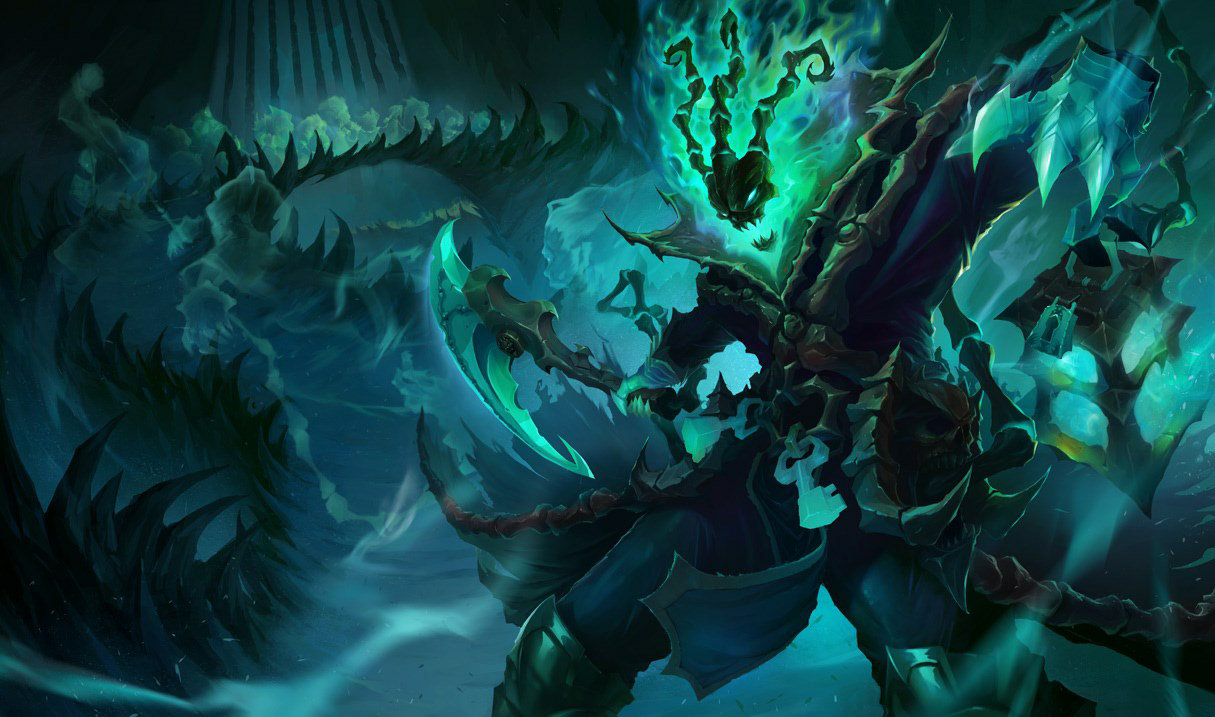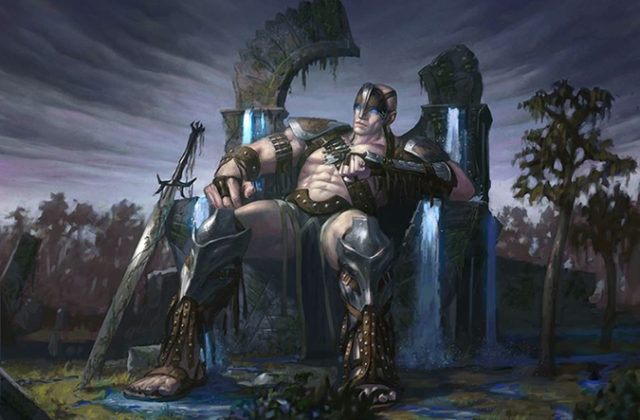For my first ever blog post (this is an all-new experience for me), I would like to talk about something that I feel applies to lots and lots of different games, and probably to different areas of life too. But let's not get too esoteric here. The concept in question is something that I like to refer to as "interaction," and it's something I'll probably reference in the future a bunch of times as well.
So where did I first hear this referred to as interaction? I believe that I first heard about this in reference to League of Legends. (Bear with me for a moment - lots of LoL-speak incoming. Buckle up.) As I recall - this was a few years ago, at this point - some Riot employees talked about interaction as a measure of fun in the game. In other words, how were you interacting with the other players in the game? If your champion had lots of ways to interact with enemies and allies alike, based not only on actual game mechanics but also in terms of overall style of play, then chances are that he or she is a fun champion to play (and, more importantly, to play against). On the flip side, if your champion had very few ways to interact, then it was likely that your champion is not particularly fun to play against. Some people like to call these non-interactive champions "Garens," although not everyone subscribes to this philosophy.
But to give an idea of what I'm talking about here, imagine a champion who had a targeted skill that said "Target champion dies." Even if it's fun for the player behind the computer (because, let's be honest, who doesn't like to just press R and delete someone from the game?), it's not really enjoyable for any of the opponents. There's no interaction there. There's no way to dodge the skill, no way to mitigate the damage - really, there's nothing you can do besides just sit there and take it.
In contrast, though, let's look at a champion like Thresh, for instance. Even if you don't like him, you have to admit that there's a lot of interaction between players built into his kit.
You should all take a moment and listen to this parody song by Instalok.
Go ahead. I'll wait.
If you see him winding up for a hook, you can sidestep it or try to outrun it. If you see him toss his lantern backward, you can take a step back to avoid the inevitable J4 outta nowhere. If you see him toss his lantern forward to pick up a soul, you can capitalize on its cooldown to attack him. If you see him just stepping forward to grab a soul, you can capitalize on that opportunity as well. If he basic attacks a minion, you can jump on him knowing that the bonus Flay damage won't be there for his next attack. Lots of different ways to position yourself, take advantage of weaknesses, and try to avoid his power points, all in one four-skill kit. And interaction isn't a one-way street, either! As a Thresh player, if you see that the one Caitlyn likes to sidestep to the right each time you throw out a hook, you may want to try purposely missing in an attempt to have her sidestep into it. You also have to make lots of split-second decisions about how to use his skills. Again, tons of ways to interact with an opponent that means that no matter what you're doing, lots of quick decisions are being made, lots of sidestepping and positioning is occurring, and it's generally a fun and hopefully rewarding experience for all players involved.
Now let's break away from League for a bit. (Those non-League-playing readers can take a breath of relief now.) And let's look at interaction through the lens of Magic: the Gathering! There's one breed of deck that somehow consistently shows up in all sorts of Standard and Modern and other formats, and that deck archetype is referred to as Esper Control. I know - words to strike fear into the hearts of even the most stalwart of men. These decks are white, blue, and black (if you're unfamiliar with the color system in Magic, I'll most probably do a series of posts about the colors sometime in the future), which means that the cards involve counterspells, kill spells, and removal galore, generally pillow-forting and waiting the game out while you slowly bleed your opponents dry. I dunno about you, but that sounds really boring to me. At least, to play against. You try to play a creature, and it gets exiled as soon as it hits the board. You try to cast an instant or sorcery, and it immediately gets countered and fizzles out. All the while, your opponent is sitting there with this stupid grin on his face and he ticks his life counter up, saying "And you lose 4 life. So, uh... what's your life total now?"
Yes, I'm talking about you, Oloro. Mr. "Most-Played Commander
of the Format." Look at him. Look at that pretentiousness. I don't even
know if that's a word. Ugghhh.
of the Format." Look at him. Look at that pretentiousness. I don't even
know if that's a word. Ugghhh.
So, especially in one-on-one situations, an Esper control deck typically (from what I've seen) leaves only the Esper player actually playing the game, while the opponent sits there and literally everything he or she attempts is foiled instantaneously. Which is why I personally prefer creature-based decks. Saying "I attack with just my Hydra Broodmaster" has infinitely more interactions in it than saying "I cast Cancel and counter your spell." Because in one attack, the opponent has tons of things to do. Dozens of things can run through my head in a single attack phase. Do I have a creature to block with? If so, am I willing to sacrifice my own creature in order to block some damage? What if it's a creature with equal power and toughness? Am I willing to make that trade? He has some lands untapped - what if he's just going to Giant Growth and win the trade anyway? Hmm, maybe he's just bluffing and doesn't think I'll block. But wait - I also have untapped lands! What spells do I have in hand to help with this attack? It's only 7 damage though, and I'm still at 34 life - I can probably just take that, right? To me, that sort of thinking and interacting between players - even when it's unspoken like that - is what makes games of Magic fun.
Now, I'm not trying to say that any particular type of deck is wrong. I'm also not trying to say that you shouldn't do everything you can to win - winning is a ton of fun, and I know that I can get competitive when it comes to Commander games in Magic. Competition is just another part of enjoying the game, and you shouldn't have to abandon that for the sake of making sure the other person is enjoying themselves. But what I do think is that balance is important. And if you have that one card in your deck that makes your friends want to flip the table and punch you in the face, maybe consider switching it out for something else.
Or not. I'm not a cop. I, too, sometimes enjoy the look of frustration that I get. Like I said, it's about balance between the cathartic pleasure of watching the last hopes for victory fade from your opponent's eyes... and the interactions that make the game a little more fun for everyone involved.
Before I wrap up this first, rather lengthy post, I just want to touch on one last game, which is Dungeons & Dragons. The thing that I think makes RPGs like D&D a ton of fun is the fact that they are grounded in interaction. The point of the game is having the players interact with the world that the DM (or GM, or whatever you want to call yourself) creates, and the encounters that the DM provides for the players. The DM gets to interact with the players through the same events. And the best games of D&D have a ton of interactions between the players themselves. This, I think, is one of the reasons why people who play D&D don't like players who focus too much on the gameplay mechanics. Everyone who has played D&D has had the one player who just doesn't talk, doesn't interact with the people at the table, and just says something along the lines of "Oh, it's my turn? I attack the nearest orc with my longsword." And that's the most you'll get out of them. That sort of player doesn't really contribute much to the game, in my opinion, because of the lack of interaction with the story and the other people at the table.
So to make a long story short, interactions between players in a game are a big part of what makes games fun to play, in my opinion. That's why you'll always see people gravitating toward the couch multiplayer games like Smash Bros. and Mario Party, or playing games like D&D which are pretty much completely interaction-dependent. And while interaction isn't the only thing that makes a game fun, I think it's the most important thing when it comes to making a game fun for everyone, not just the winner.
Oh, and by the way, how many people still have that Instalok song stuck in your head? Because I know I do.


No comments:
Post a Comment